- Home
- Daniel Woodrell
The Maid's Version
The Maid's Version Read online
Table of Contents
Also By Daniel Woodrell
Title Page
Copyright
Dedication
Epigraph
She frightened me …
She hated that …
Miss Dimple Powell …
East Side: dirt …
Ruby DeGeer didn’t …
Mr. Arthur Glencross …
Reporters arrived from …
Mr. Lawrence Meggs …
The Dunahews had …
Her hands ached …
At least twice …
He didn’t know …
The Burton family …
She has washed …
The congregated silhouettes …
Buster Dunahew did …
The second crucial …
During those years …
He robbed banks. …
At age ten …
Mae Poltz and …
I wore Ruby’s …
Trains have haunted …
Joe Breen didn’t …
Arthur Glencross wandered …
It just started …
About the Author
Also By Daniel Woodrell
The Outlaw Album
Winter’s Bone
The Death of Sweet Mister
Tomato Red
Give us a Kiss: A Country Noir
The Ones You Do
Muscle for the Wing
Woe to Live On (reissued as Ride With the Devil)
Under the Bright Lights
THE MAID’S VERSION
DANIEL WOODRELL
www.sceptrebooks.com
First published in Great Britain in 2013 by Sceptre
An imprint of Hodder & Stoughton
An Hachette UK company
1
Copyright © Daniel Woodrell 2013
The right of Daniel Woodrell to be identified as the Author of the Work has been asserted by him in accordance with the Copyright, Designs and Patents Act 1988.
All rights reserved. No part of this publication may be reproduced, stored in a retrieval system, or transmitted, in any form or by any means without the prior written permission of the publisher, nor be otherwise circulated in any form of binding or cover other than that in which it is published and without a similar condition being imposed on the subsequent purchaser.
All characters in this publication are fictitious and any resemblance to real persons, living or dead is purely coincidental.
A CIP catalogue record for this title is available from the British Library
Ebook ISBN 9781444732863
Hodder & Stoughton Ltd
338 Euston Road
London NW1 3BH
www.sceptrebooks.com
In memory of Grif Fariello
These are the things the starry sky is set above:
loneliness of the dead, courage of youth, and timber
that’s carried slowly away on great rivers.
—Rolf Jacobsen
A wounded deer leaps highest.
—Emily Dickinson
Thou desirest truth in the inward parts.
—Psalms 51:6
She frightened me at every dawn the summer I stayed with her. She’d sit on the edge of her bed, long hair down, down to the floor and shaking as she brushed and brushed, shadows ebbing from the room and early light flowing in through both windows. Her hair was as long as her story and she couldn’t walk when her hair was not woven into dense braids and pinned around and atop her head. Otherwise her hair dragged the floor like the train of a medieval gown and she had to gather it into a sheaf and coil it about her forearm several times to walk the floor without stepping on herself. She’d been born a farm girl, then served as a maid for half a century, so she couldn’t sleep past dawn to win a bet, and all the mornings I knew with her she’d sit in the first light and brush that witchy-long hair, brush it in sections, over and over, stroking hair that had scarcely been touched by scissors for decades, hair she would not part with despite the extravagance of time it required at each dawn. The hair was mostly white smeared by gray, the hues of a newspaper that lay in the rain until headlines blended across the page.
She spooked me awake daily that whole summer of my twelfth year, me awaking to see her with the dawn at her back, springs squeaking faintly, while a bone-handled brush slid along a length of hair that belonged in a fairy tale of some sort, and maybe not the happy kind. Her name was Alma and she did not care to be called Grandma or Mamaw, and might loose a slap if addressed as Granny. She was lonely, old and proud, and I’d been sent from my river town near St. Louis by my dad as a gesture of reconciliation. She was glad I’d been sent and concerned that I have a good time, a memorable summer, but she was not naturally given to much frolic; the last hours of play she’d known had been before World War I, some game now vanished from childhood that involved a rolling wooden hoop and a short stick. She tried taking me for long walks about the town of West Table, going to People’s Park so she could watch me splash in the pool, let me pull weeds in the garden and throw a baseball against the toolshed door. It was the summer of 1965, but she still did not have a television, only a radio that seemed always to be announcing livestock prices and yield estimates. There was a twang stretching every word Alma said, but for days and days she didn’t say much. Then came a late afternoon when I was dramatically dispirited, moody and bored, foot idly kicking at things I’d been told not to kick, a sweltering day that turned dark as a sinister storm settled overhead, and we sat together on her small porch in a strong wind to watch those vivid actions break across the sky. Storm clouds were scored by bright lightning, and thunder boomed. Her dress was flapping, her eyes narrowed and distant, and she cunningly chose that raging moment to begin telling me her personal account of the Arbor Dance Hall explosion of 1929, how forty-two dancers from this small corner of the Missouri Ozarks had perished in an instant, waltzing couples murdered midstep, blown toward the clouds in a pink mist chased by towering flames, and why it happened. This was more like it—an excitement of fire, so many fallen, so many suspects, so few facts, a great crime or colossal accident, an ongoing mystery she thought she’d solved. I knew this was a story my dad did not want me to hear from her lips, as it was a main source of their feud, so I was tickled and keen to hear more, more, and then more. Dozens were left maimed, broken in their parts, scorched until skin melted from bones. The screams from the rubble and flames never faded from the ears of those who heard them, the cries of burning neighbors, friends, lovers, and kinfolk like my great-aunt Ruby. So many young dead or ruined from a town of only four thousand raised a shocked, grievous howling for justice. Suspicions were given voice, threats shouted, mobs gathered, but there was no obvious target for all the summoned fury. Suspects and possible explanations for the blast were so numerous and diverse, unlinked by convincing evidence, that the public investigation spun feebly in a wide, sputtering circle, then was quietly closed. No one was ever officially charged nor punished, and the twenty-eight unidentified dead were buried together beneath a monumental angel that stood ten feet tall and slowly turned black during year after year of cold and hot and slapping rain.
Alma yet lived in a small room with a small kitchen in the back portion of her last employer’s house, and it was tight living. Her bed and the couch I slept on were five feet apart. Her sleep was chatty; she had one-way chats with people she’d once known or her sleep invented. She sometimes mumbled names I’d heard around the dinner table. She often wept without sound at night until tears shined her neck, and made dull daytime company for a boy unless she was adding wrinkles to her story. When in the telling mood she’d sit on the porch for hours staring toward the dry white creek bed out back while drinking tea
to keep her voice slickened, leaving each used tea bag in the cup when adding a fresh one and more water, soaking every penny’s worth of tea into her cup until she sipped bitter trickles between four or five derelict bags. She would at times leave the public horror and give me her quiet account of the sad and criminal love affair that took her sister Ruby away from us all, left us with only pain, many dark mysteries, and a woman’s hat with a long feather in the band.
Alma had been allowed to stay in school to the completion of third grade, then was sent to work some years in her daddy’s fields before finding her way to town and becoming a laundress, a cook, an all-purpose maid. She lost two sons along the way, her husband, her sister, and earned but little, always one dropped dish and a loud reprimand from complete and utter poverty. She lived scared and angry, a life full of permanent grievances, sharp animosities and cold memories for all who’d ever crossed us, any of us, ever. Alma DeGeer Dunahew, with her pinched, hostile nature, her dark obsessions and primal need for revenge, was the big red heart of our family, the true heart, the one we keep secret and that sustains us.
It was years before I learned to love her.
Our long walks that summer did if nothing else prepare me to accept an early bedtime, for they were tiring and detailed. At any corner or alleyway, empty lot or spruced old house, she was liable to stop and leave me in her mind, revisiting yet again insults she couldn’t forgive. “That place there was home to Mrs. Prater, who cheated me of near eleven dollars when your uncle Sidney was a-dyin’ in bed with no medicine for the pain. He moaned constant as the wind and couldn’t catch his breath. Not even fourteen years old. She had her a few daughters, and one has married here and stayed—her children are named Cozzens. Couple of boys. Your big brother could whup either of them pukes this minute without even needin’ to put his sandwich down. Years to come you’ll thrash ’em, too, if you should be so blessed as to come across one somewhere behind a building, or in the trees, and hear that name.”
Or she’d drift in thought while staring at an empty spread of dirt and grass between two homes, and say, “Used to be a house here had a porch that went all the way around, with strangler vines growing up the sides, had those windows like eyes up top. Mr. Lee Haas lived there. He run the last dry goods near the square that would give us anything on tick. But his wife squawked over me bein’ crazy and full of slander, the fool, and he cut me dead when most needed. That year was 1933, I think.” She waved a big old withering hand at the lot where the house had been, spit toward the grass but fell short, so she stepped fully into the lot and spit again. “But you can forget them—God done for them, and done ’em up good, too, during the war.”
On these rambles the cemetery was nearly always our final destination. We’d make our way through the wilderness of headstones, gray, brown, puritan white, glancing at some, nodding at some, Alma turning her nose up at others, until we reached the Black Angel, the sober monument to our family loss and a town bereaved. Standing in the shadow of this angel she would on occasion tell me about a suspect person or deed, a vague or promising suspicion she’d acquired with her own sharp ears or general snooping, and when she shared the fishy details with me it would be the first time she’d said them aloud to anybody in years. She’d repeat herself so I’d remember. We’d then walk home, going into the fat shade under the fat trees on East Main, and stop at Jupiter Grocery, where she always said, “Your momma’s grandpa on her momma’s side worked here thirty years. He cut a good piece of meat.” We’d prowl the aisles and assemble the evening meal, a meal usually made of the cheapest foodstuffs, some of which I’d never before considered as food and was scared to touch—calves’ brains to be served with scrambled eggs, souse for sandwiches I’d throw behind the shed, pigs’ feet and saltines, pork rind and corn pone, chicken livers by the pound that she rendered into a bizarre gravy that was so surprisingly fine over egg noodles or white rice that I learned to whine for it as we walked. We’d eat together in her snug quarters, an early supper, always, elbow to elbow, watching squares of sunlight lose their shape along the walls, and return to the unending topic while forks clicked on her best plates, “What’d you learn today, Alek, and what use will you make of it?”
And Alma did that summer make certain that I knew this spot and that these pictures would be planted in my head, grow epic, never leave: The Arbor Dance Hall stood across the street from a row of small houses and one still stands. A house with nothing to recommend it but its age, shown up meanly in sunlight and made to look ancient in shadow. The yard between the house and the railroad tracks has become a worn patch of dust, the old oaks have withered from their long days and begun to founder toward earth, and no new neighbors have been built. In 1929, on this narrow span of sloping ground between the town square and the tracks beside Howl Creek, there had been six houses, five now gone, the dance hall, and the long-demolished Alhambra Hotel. At the bottom of the yard near the railroad ties and shined rails there are burnished little stumps where elms that likely witnessed everything had been culled in the 1950s after the Dutch blight moved into town and caught them all.
The explosion happened within a shout and surely those in the house must have heard everything on that bright evening, the couples arriving, strolling arm in arm or as foursomes, the excited laughter, the cooed words, the stolen kisses on the way to the dance, all carrying loudly on that blossom-scented night between the wars, here in the town this was then of lulled hearts and distracted spirits. A Saturday of sunshine, the town square bunched with folks in for trading from the hills and hollers, hauling spinach, lettuce and rhubarb, chickens, goats and alfalfa honey. Saturday crowds closed the streets around the square and it became a huge veranda of massed amblers. Long hellos and nodded goodbyes. Farmers in bib overalls with dirty seats, sporting dusted and crestfallen hats, raising pocket hankies already made stiff and angular with salt dried from sweat during the slow wagon ride to town. In the shops and shade there are others, wearing creased town clothes, with the immaculate hankies of gentlefolk folded to peak above breast pockets in a perfect suggestion of gentility and standing. The citizenry mingled—Howdy, Hello, Good gracious is that you? The hardware store is busy all day and the bench seats outside become heavy with squatting men who spit brown splotches toward the gutter. Boys and girls hefted baskets of produce, munched penny candy, and begged nickels so they could catch the matinee at the Avenue Theater. Automobiles and trucks park east of the square, wagons and mules rest north in the field below the stockyard pens, and after supper folks made their way downhill to the Arbor … and just as full darkness fell those happy sounds heard in the surviving house suddenly became a nightmare chorus of pleas, cries of terror, screams as the flames neared crackling and bricks returned tumbling from the heavens and stout beams crushed those souls knocked to ground. Walls shook and shuddered for a mile around and the boom was heard faintly in the next county south and painfully by everyone inside the town limits. Citizens came out their doors, stunned, alarmed to stillness, then began to sprint, trot, stagger in flailing and confused strides toward this new jumping light that ate into the night.
A near portion of the sky founted an orange brilliance in a risen tower, heat bellowing as flames freshened in the breeze and grew, the tower of orange tilting, tossing about, and the sounds dancers let loose began to reach distant ears as anonymous wails and torture those nearby with their clarity of expression. There were those who claimed to have heard words of farewell offered by victims in the air or in the rubble, and some must be true accounts; so many citizens crawled into the flames to pull at blistered, smoking bodies that turned out to be people they knew, sisters, uncles, sons or pals. As with any catastrophe, the witness accounts immediately began to differ, as some saw dancers blown three hundred feet toward the stars and spreading in a spatter of directions, while others saw them go no more than a hundred and fifty feet high, give or take, though all agreed that several fortunate souls were saved from death by the force of their throwing, landing beyo
nd reach of the scorching, pelted with falling debris, yes, and damaged, but not roasted skinless, hairless, blackened and twisted on their bones.
The nearest witness to survive and offer prompt testimony was eighty-nine-year-old Chapman Eades, an ex-Confederate, veteran of Pea Ridge and the siege of Vicksburg, who lived in the Alhambra. He did not see well and could not follow a conversation in his own little room without the aid of an ear trumpet. The next day Mr. Eades said to the West Table Scroll, “I don’t know what they was arguin’ about. They was over behind the back wall and I never seen them as nothin’ but shapes standin’ in shadows. But they was arguin’ about somethin’ awful lively, then the music struck up again and all hell came callin’ soon after.”
Throughout that summer human scraps and remains were discovered in gardens two streets, three streets, four streets away, kicked up in the creek by kids chasing crawdads, in deep muck at the stockyards halfway up the hill. That fall, when roof gutters were cleaned, so many horrid bits were come across that gutters became fearsome, hallowed, and homeowners let a few respectful leaks develop that winter rather than disturb the dead.
My mother was never poor until she married. She was born a Hudkins, her place in the world was not Alma’s, and she’d first met my father when he was the paper boy and she swooned for his dimples and blue eyes. She would’ve been around eight or ten (depending on what her true birth date is, for several have been claimed) and he was fourteen or so. The house had been given a name, even, called Hudkins, a large and comfortable old home with a full city block for a backyard, all fenced with white rails, two horses grazing or snuffling from the trough, a serviceable pickup truck parked in the dirt drive, a new sedan in the garage, the gray walls of the cemetery ever visible just beyond the farthest rails and across one street. Mother pestered Dad with friendly comments and he suspected mockery, mockery of everything about him, from boondockers held together with twine to his bib overalls that fit him better a year earlier and his sullied name, so he stooped to ground and raised to throw rocks at her without trying to bruise or come too close. She never forgot the excitement of having his full attention. Years later, while Dad was home on leave during the final hours of World War II, they locked eyes at the Echo Club, she in a pink sweater and saddle shoes, he wearing his navy hat cocked saltily, the band playing swing, and both remembered the rocks. Nature did the rest and they married soon. Her father, Harlan Hudkins, never forgave Dad for knocking her up so young (Mom would lose the first two babies and feel doomed until a robust boy survived to be born in 1950), or her for being weak to a goddam Dunahew, no matter how sweetly he danced, and he had his ways of making everybody pay, even his only blue-eyed grandson, though I was always told to feel welcome, just come on by, and did visit happily many, many times. He was a big rugged man with a fabled past in athletics, wearing a Stetson hat colored pearl, a Roi-Tan cigar chomped between his teeth, owner of a feed mill, a few rental properties and several tracts of timberland. Harlan hunted often, for quail locally and pheasant up north, and kept bird dogs, three or four at a time, penned out behind the house. After the marriage of my parents he named every dog he had, or would ever have, Buster, the nickname of Alma’s husband. Both of my brothers could step into a Hudkins family photo from any era and blend—I am all Dunahew in appearance, and Harlan noticed. I had a choked, complicated regard for him, he was a powerful presence with so many qualities boys admire, but I identified as a Dunahew in my bones and attitudes, grandson of a drunken bum and a maid who couldn’t read a grocery list, and said so often. Harlan heard me.

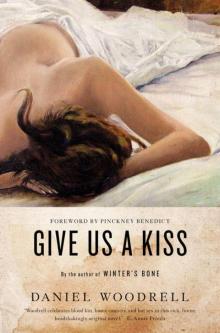 Give Us a Kiss: A Novel
Give Us a Kiss: A Novel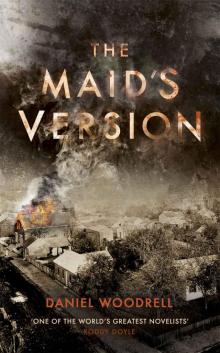 The Maid's Version
The Maid's Version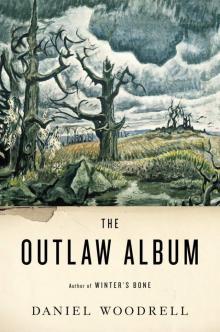 The Outlaw Album: Stories
The Outlaw Album: Stories Tomato Red
Tomato Red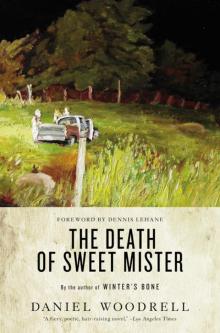 The Death of Sweet Mister
The Death of Sweet Mister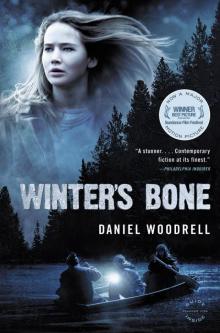 Winter's Bone
Winter's Bone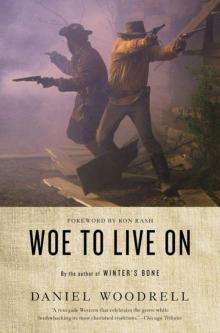 Woe to Live On: A Novel
Woe to Live On: A Novel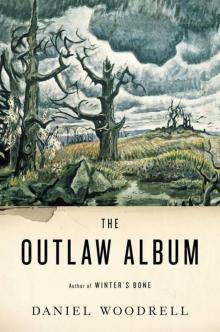 The Outlaw Album
The Outlaw Album